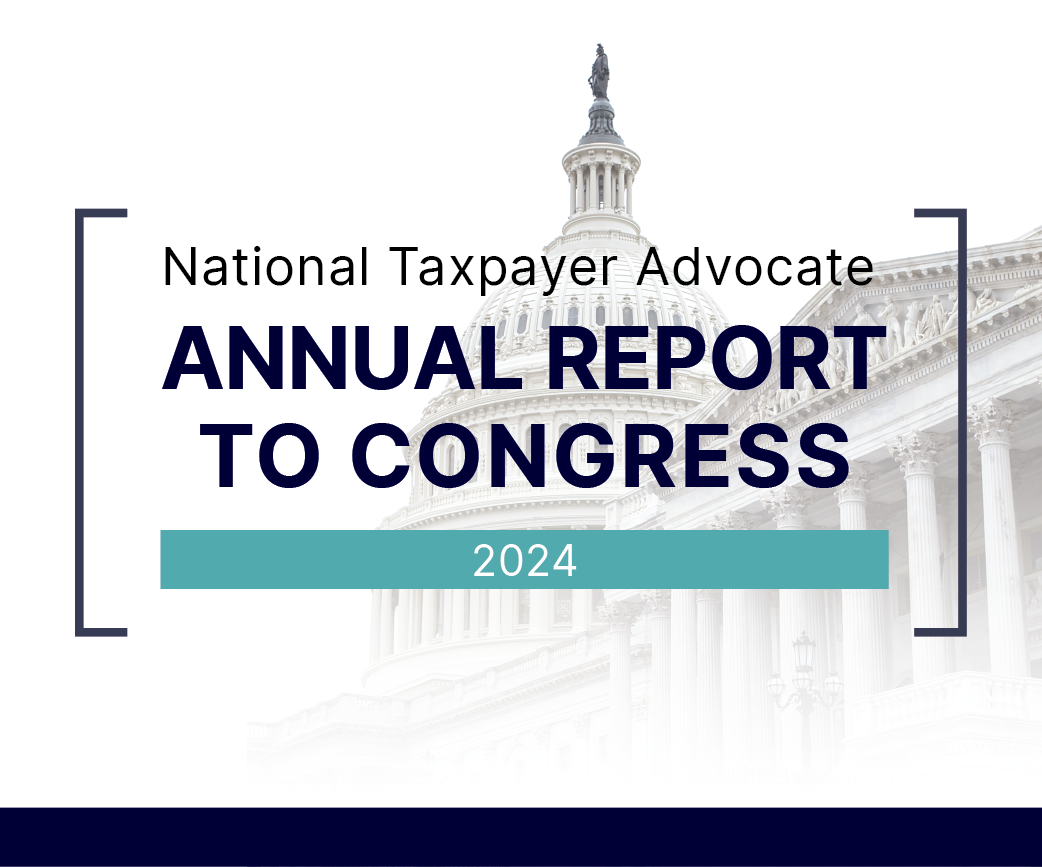

National Taxpayer Advocate Erin M. Collins today released her 2024 Annual Report to Congress, acknowledging improvements in IRS taxpayer service but also highlighting persistent challenges, particularly delays in processing Employee Retention Credit (ERC) claims and resolving Identity Theft Victim Assistance (IDTVA) cases.
“For the first time since I became the National Taxpayer Advocate in 2020, I can begin this report with good news: The taxpayer experience has noticeably improved,” Collins writes. “In 2024, taxpayers and practitioners experienced better service, generally received timely refunds, and faced shorter wait times to reach customer service representatives…. After receiving multiyear funding, the IRS has [also] made major strides toward improving its taxpayer services and information technology (IT) systems.”
By law, the National Taxpayer Advocate’s report must identify the ten most serious problems taxpayers face in their dealings with the IRS and make administrative and legislative recommendations to address those problems. Two of the most critical issues are:
In addition to ERC and IDTVA processing delays, the report identifies eight other serious taxpayer problems, including the following:
In her preface to the report, Collins emphasizes the need for adequate funding to support critical taxpayer services and technology upgrades. She notes that the bulk of the nearly $80 billion in multiyear IRS funding provided by the Inflation Reduction Act (IRA) was allocated for tax law enforcement and has been controversial. She further notes, however, that there has been bipartisan support for the smaller amounts allocated for taxpayer services and IT modernization. Stressing the importance of Taxpayer Services and Business Systems Modernization (BSM) funding, she urges Congress, if it cuts IRA enforcement funding, not to make commensurate cuts to taxpayer services and IT. Congress should not, Collins urged, “inadvertently throw out the baby with the bathwater.”
“With sufficient funding for Taxpayer Services and BSM, I believe the IRS can exponentially build on the improvements of the last two years and produce a tax system that respects taxpayer rights, is world-class, and makes compliance easier, which will likely improve revenue collection as well,” Collins writes.
The National Taxpayer Advocate’s 2025 Purple Book proposes 69 legislative recommendations intended to strengthen taxpayer rights and improve tax administration. Among the recommendations:
The report contains three TAS research studies offering insight into challenges facing taxpayers and practitioners and recommending ways to improve IRS services and processes.
This year marks the 25th anniversary of the Taxpayer Advocate Service, which was created by Congress as part of the IRS Restructuring and Reform Act of 1998. After developing an organizational structure, TAS officially launched in March 2000, and over the past quarter century, it has been a strong advocate for taxpayers, ensuring their voices are heard and their rights are protected.
“For 25 years, TAS has served as the ‘safety net’ for taxpayers experiencing problems with the IRS and as Congress’s eyes and ears within the agency on issues of taxpayer rights and taxpayer burden,” Collins writes.
Since inception, TAS has helped more than 5 million taxpayers resolve their account problems, worked hundreds of advocacy projects with the IRS, made hundreds of recommendations to improve the IRS’s administrative practices that the agency has implemented, and made hundreds of recommendations for legislative change, many of which Congress has enacted. As TAS celebrates its 25th anniversary, it remains committed to resolving taxpayer account problems and identifying and addressing systemic issues within the IRS to improve the taxpayer experience.
This year’s report also contains:
Visit https://www.taxpayeradvocate.irs.gov/AnnualReport2024 for more information.
Subscribe to receive the National Taxpayer Advocate’s blogs about key issues in tax administration in your inbox or read previous blogs.
Want to get the latest tax news, learn more about taxpayer rights, and upcoming TAS events while looking at cute dogs and pop culture references? Look no further than TAS Social Media. Follow, like and share our content to help spread the work on how we advocate for taxpayers!
